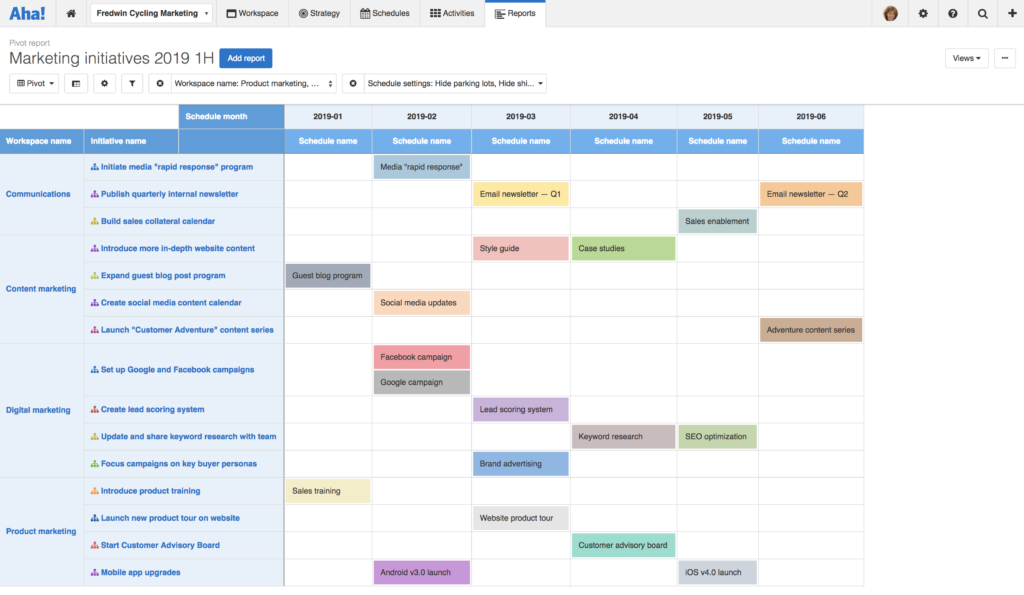
Marketing Strategy vs. Marketing Plan — What Is the Difference?
Do marketing teams need strategy? I recently answered this question with an emphatic Y-E-S. Strategy allows bold marketers to use their creativity to drive the growth of a company. Yet far too many marketing teams are working without strategy. Some do not even have a firm marketing plan.
In order to do meaningful work, you need to know where you are going and how you will get there. In other words, you need a marketing strategy and a marketing plan.
Build your marketing plan in Aha! Roadmaps — free for 30 days.
The marketing strategy is your approach to achieving your competitive advantage — the marketing plan contains the activities that will get you there.
The strategy is the why behind the work, and the marketing plan is the when and the what that describes the work. While this is a rather simple definition, there is often confusion around strategy versus planning. This is especially true if you work on a team that does not lead with strategy. You might wonder — do marketing teams really need both? What are the differences?
The first question is easy enough. Yes, you need both. The latter will take a bit more time to explain, which is why I have detailed my answer below.
Here are the key differences between a marketing strategy and a marketing plan:
Purpose
The purpose of a marketing strategy is to capture the marketing goals — what needs to happen for your product or service to reach the right customers and do well in market. Strategy keeps the team aligned around those shared goals by helping everyone understand who will get the most value from your offerings (the target audience), the value proposition, and how you will reach your ideal customer.
The purpose of a marketing plan is to describe and visualize for the team when and how you will accomplish those goals. Plans establish the timeline and themes of your work — your campaigns and programs — and allow you to prioritize the activities within each based on your strategy. This makes it clear how every activity connects to both the marketing goals and overall business goals.
Timing
A marketing strategy should be created before you do any actual work. It lays the foundation for all your campaigns and activities. But you do not need to craft a new one for each new campaign. To make a real impact, your marketing strategy should not change significantly in a short period of time. Instead, reevaluate it quarterly and make adjustments as you see changes in your market, team, and budget.
A marketing plan should be created once you have an established marketing strategy — a clear understanding of why you are doing the work. You might create a variety of different plans over a quarter — for different campaigns or programs or by teams such as product, digital, and content marketing. Each plan should be time-bound and include key dates for when a given activity needs to be completed.
Components
The marketing strategy usually contains the following:
Company vision and goals
Marketing goals
Initiatives
Positioning
Brand essence
Buyer personas
Competitive landscape
The marketing plan usually contains the following:
Campaign goals
Timeline with key milestones
Channels to be used
Budget
Activities
Dependencies
Reports
A marketing strategy should be created with the leadership team or, at a minimum, have their agreement. One of the best ways to share your strategy is to present how your major initiatives map to the objectives via a strategy report. It showcases that you are thinking about how everything is connected.

Your colleagues will need to understand the details of your marketing plan. This makes sense because they need to know how they can help and what dependencies exist. There are many visual ways to share this. For example, show this by creating a schedule as a Gantt chart or calendar. These kinds of reports show the timeline for when each activity needs to be completed and who the owner is.

Strategy and plans work together to motivate the team — so you can move forward boldly, with purpose.
So, how do you go about formalizing your marketing strategy and your marketing plan? Each one has many components, so it can be difficult to track in a spreadsheet or documents that are not widely shared. You may want to consider using a purpose-built marketing planning tool — which makes it easy to set strategy, build visual plans, work on activities, and report on the results.
No matter where you log the details, you need to make the information accessible to each member of the team. This way you can keep everyone moving forward — focused on the big goals and plans. Because yes, marketing teams need strategy too.
Launch breakthrough marketing campaigns with Aha! Roadmaps. Start a free 30-day trial.



